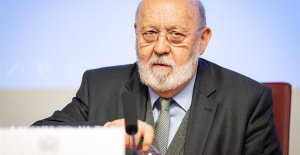MADRID, 20 Ene. (EUROPA PRESS) -
The European fund managers consulted by Bank of America (BofA) for its January survey have aggravated their commitment to underweight the Spanish stock market in 2024 and have placed it as the second least attractive investment destination after Italy.
All in all, despite the fact that the January figure has been worse than December and is close to that of November - it would still have some way to go to match the bearish sentiment of October -, Spain is no longer considered the worst investment destination, as and as the December survey showed, since Italy has been the worst stop on this occasion.
For its part, the German stock market has changed direction and, after managers decided to overweight it last December, they have now punished it with an underweighting that places it just below the Spanish stock market.
In contrast, the survey, in which a total of 256 managers with assets under management valued at 669,000 million dollars (614,700 million euros) participate, has placed the British stock market as the most attractive for the next twelve months until the point that they have doubled down on December's overweight bet.
After the British, the managers have highlighted the Swiss stock market, which has notably improved its overweight mark and practically matches the interest in the London stock market, while French shares have in turn improved the overweight preference with respect to the data December.
In the same survey, European managers have ruled out the possibility of a recession in Europe - although they do foresee an economic slowdown - and have been convinced that European inflation will decrease and the European Central Bank (ECB) will cut interest rates to throughout the year.
Specifically, the rate of participants who foresee a European recession has moderated from 71% to 53%, although there is a clear majority of 83% who estimate that European growth will suffer from the slowdown in economic activity. For their part, only 2% of participants believe that the global economy will enter a recession in the next twelve months, the lowest level since June 2022.
Regarding inflation, 86% of managers have pointed out that core inflation will decrease throughout the year, while 71% expect the same on a global scale, so both considerations are at levels close to the record.
Linked to this, the main concerns of managers now focus on the worsening of geopolitics (25%) and a hard landing (24%), while inflation is in third position with the support of 21% of the surveyed.
For their part, a large majority, up to 89%, believe that short-term interest rates will fall in the next twelve months, the highest proportion on record, while 36% believe that 10 bond yields years will fade, close to an all-time high.
Given this situation of 'macro' forecasts, and especially despite the short-term risks, 72% of European managers see growth for European stocks in the next twelve months, the highest percentage in almost two years.
All in all, after the strong rebound since October, 56% expect a short-term decline for the European market, although this figure is down from 65% last month. Linked to this, in this Tuesday's session the Ibex 35, the main indicator of the Spanish market, closed below 10,000 points for the first time in almost two months.
A plurality of 44% consider earnings per share declines to be the most likely cause of a European market correction, followed by weakening macroeconomic data at 17%.
The survey found that 36% of respondents see greater downsides for European cyclical stocks compared to defensive ones after the recent weakness, down from 59% last month, but still a plurality, according to Bofa.
Half of managers see disadvantages for European value stocks compared to growth stocks in response to the dovish stance of central banks.
By sector, insurance remains the largest consensus overweight sector in Europe, ahead of utilities (after a jump in positioning) and pharmaceuticals.
In contrast, despite less concern for cyclicals in general, they dominate the underweights, particularly autos, retail and chemicals.
The survey of global fund managers consulted by Bank of America (BofA) has revealed a similar scenario to that of European managers, offering a "very optimistic" outlook on rate cuts and a 'soft' landing for the economy. ".
Specifically, 79% of these investors foresee a soft slowdown for 2024, which represents an unprecedented maximum for nine months, while only 17% project a 'hard' landing, a minimum for nine months. Thus, up to 41% of managers go further and rule out any recession for the current year, which is a maximum never seen.
For their part, a majority of up to 91% takes rate cuts for granted in one year's time - 87% already held that opinion in December - while the global outlook for profits has improved in January, although with the risks geopolitical as the main tailwind.
Likewise, investors have shown a negative outlook on China's economic growth for the first time since spring 2022.
The chief economist for Europe at Bank of America, Rubén Segura-Cayuela, assured this Friday that they do not expect changes in monetary policy, nor important changes in communication (but greater pressure on market prices) from the Central Bank (ECB) next week, when they will hold their monetary policy meeting - the Fed's turn will come the following week.
For the executive, the ECB "wants [to wait to] see the spring data on profits, wages and inflation", so they maintain their opinion that the first cut of 25 basis points will occur in June.
However, he warned that "given the rapid disinflation, the risks point to faster action thereafter."
"We are increasingly nervous about the possibility that the data will force the ECB to cut once in each subsequent meeting, instead of quarterly, an accelerated pace that we did not expect until 2025," Segura-Cayuela stressed.

 Exploring Cardano: Inner Workings and Advantages of this Cryptocurrency
Exploring Cardano: Inner Workings and Advantages of this Cryptocurrency Seville.- Economy.- Innova.- STSA inaugurates its new painting and sealing hangar in San Pablo, for 18 million
Seville.- Economy.- Innova.- STSA inaugurates its new painting and sealing hangar in San Pablo, for 18 million Innova.- More than 300 volunteers join the Andalucía Compromiso Digital network in one month to facilitate access to ICT
Innova.- More than 300 volunteers join the Andalucía Compromiso Digital network in one month to facilitate access to ICT Innova.-AMP.- Ayesa acquires 51% of Sadiel, which will create new technological engineering products and expand markets
Innova.-AMP.- Ayesa acquires 51% of Sadiel, which will create new technological engineering products and expand markets The PP sees the concentration of support for Sánchez in Ferraz as a "failure" and believes that it "complicates" the story of its continuity
The PP sees the concentration of support for Sánchez in Ferraz as a "failure" and believes that it "complicates" the story of its continuity Marc Márquez returns to pole in Jerez
Marc Márquez returns to pole in Jerez The CIS carries out a quick survey on Sánchez's letter to measure the reaction of citizens
The CIS carries out a quick survey on Sánchez's letter to measure the reaction of citizens 12M.- Puigdemont to Sánchez and Illa: "This is not about the future of the PSOE! What have you believed?"
12M.- Puigdemont to Sánchez and Illa: "This is not about the future of the PSOE! What have you believed?" How Blockchain in being used to shape the future
How Blockchain in being used to shape the future Not just BTC and ETH: Here Are Some More Interesting Coins Worth Focusing on
Not just BTC and ETH: Here Are Some More Interesting Coins Worth Focusing on UPV students build a prototype of a wooden house to move to Equatorial Guinea
UPV students build a prototype of a wooden house to move to Equatorial Guinea The UA opens the call for the Impulso 2024 Awards for the best innovative business initiatives
The UA opens the call for the Impulso 2024 Awards for the best innovative business initiatives ALI, virtual assistant from Alicante, internationally recognized by the OECD
ALI, virtual assistant from Alicante, internationally recognized by the OECD Retrópolis brings the golden age of video games and computing to the UPV
Retrópolis brings the golden age of video games and computing to the UPV A million people demonstrate in France against Macron's pension reform
A million people demonstrate in France against Macron's pension reform Russia launches several missiles against "critical infrastructure" in the city of Zaporizhia
Russia launches several missiles against "critical infrastructure" in the city of Zaporizhia A "procession" remembers the dead of the Calabria shipwreck as bodies continue to wash up on the shore
A "procession" remembers the dead of the Calabria shipwreck as bodies continue to wash up on the shore Prison sentences handed down for three prominent Hong Kong pro-democracy activists
Prison sentences handed down for three prominent Hong Kong pro-democracy activists ETH continues to leave trading platforms, Ethereum balance on exchanges lowest in 3 years
ETH continues to leave trading platforms, Ethereum balance on exchanges lowest in 3 years Investors invest $450 million in Consensys, Ethereum incubator now valued at $7 billion
Investors invest $450 million in Consensys, Ethereum incubator now valued at $7 billion Alchemy Integrates Ethereum L2 Product Starknet to Enhance Web3 Scalability at a Price 100x Lower Than L1 Fees
Alchemy Integrates Ethereum L2 Product Starknet to Enhance Web3 Scalability at a Price 100x Lower Than L1 Fees Mining Report: Bitcoin's Electricity Consumption Declines by 25% in Q1 2022
Mining Report: Bitcoin's Electricity Consumption Declines by 25% in Q1 2022 Oil-to-Bitcoin Mining Firm Crusoe Energy Systems Raised $505 Million
Oil-to-Bitcoin Mining Firm Crusoe Energy Systems Raised $505 Million Microbt reveals the latest Bitcoin mining rigs -- Machines produce up to 126 TH/s with custom 5nm chip design
Microbt reveals the latest Bitcoin mining rigs -- Machines produce up to 126 TH/s with custom 5nm chip design Bitcoin's Mining Difficulty Hits a Lifetime High, With More Than 90% of BTC Supply Issued
Bitcoin's Mining Difficulty Hits a Lifetime High, With More Than 90% of BTC Supply Issued The Biggest Movers are Near, EOS, and RUNE during Friday's Selloff
The Biggest Movers are Near, EOS, and RUNE during Friday's Selloff Global Markets Spooked by a Hawkish Fed and Covid, Stocks and Crypto Gain After Musk Buys Twitter
Global Markets Spooked by a Hawkish Fed and Covid, Stocks and Crypto Gain After Musk Buys Twitter Bitso to offset carbon emissions from the Trading Platform's ERC20, ETH, and BTC Transactions
Bitso to offset carbon emissions from the Trading Platform's ERC20, ETH, and BTC Transactions Draftkings Announces 2022 College Hoops NFT Selection for March Madness
Draftkings Announces 2022 College Hoops NFT Selection for March Madness























